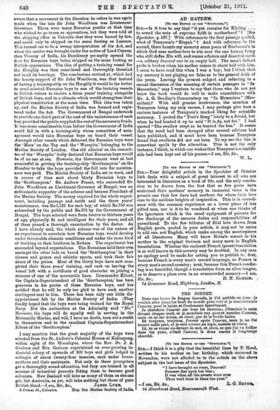AD 11 ATREM.
I-To THE EDITOR OF TEE " SFITTATOR."] SIR,—Is it true to say that "it yet remains for Kipling . . . to sound the note of supreme faith in motherhood " ? [See Spectator, p. 587.] With reference to the first passage (plated, what of Tennyson's "Rizpah " ? And with reference to the second, there haunts my memory some poem of Bnchanan's in which God uses mother-love to win over the one human being who still defies His will, and roams a frozen and deserted earth —a solitary damned one in an empty hell. The man's defiant pride is broken when his mother comes to share hell with him. I seem to have read this when I was a boy ; but I think that my memory is not playing me false as to the general drift of the poem. Leaving the present subject and referring to a recent discussion of the meaning of certain passages iu " In Memoriam," may I venture to say that those who do not yet know the book would do well to make acquaintance with Mr. A. G. Bradley's Commentary on "In Memoriam" (Mac- millan) ? With still greater irrelevance, the mention of Tennyson being my only excuse, I may perhaps give here a curious instance of Tennyson's marked liking for scientific accuracy. I quoted the " Poet's Song" lately to a friend, but when he had hunted it up he said "It is fly, not bee." I had quoted " The swallow stopt as he hunted the bee." It seems that the word had been changed after several editions had been published, and it must have been because Tennyson found that swallows did not eat bees. To my ear the line is somewhat spoilt by the alteration. This is not the only instance, I think-, in which one wishes that Tennyson's scientific side had been kept out of his poems.—I am, Sir, &c.,
W. L.














































 Previous page
Previous page